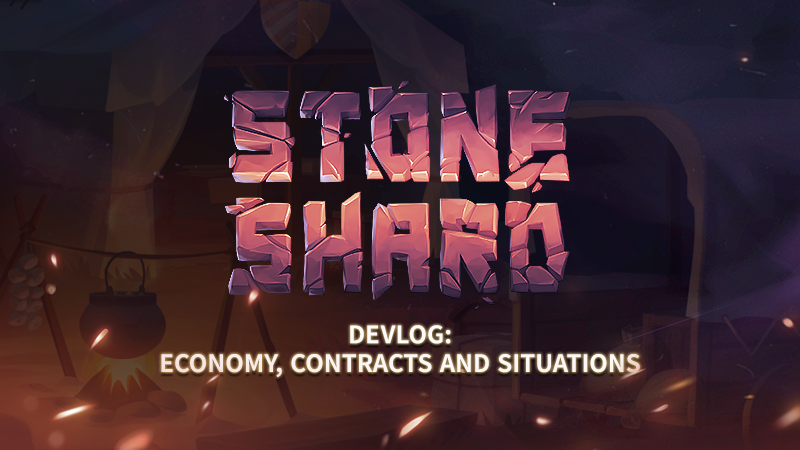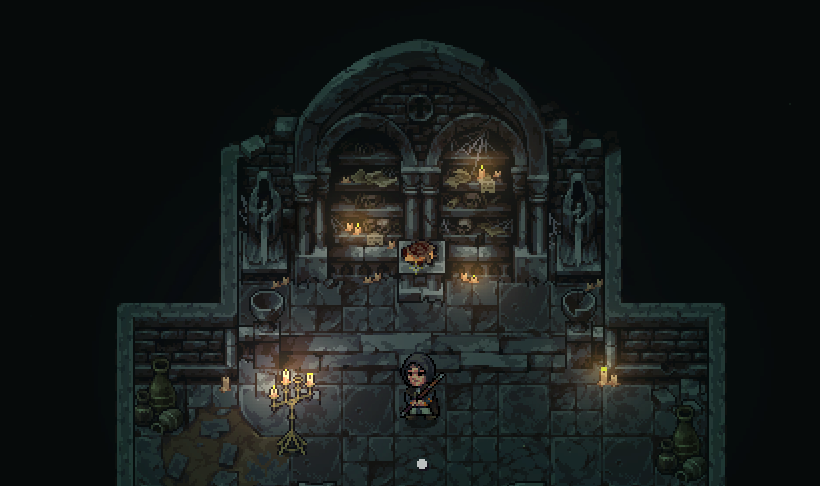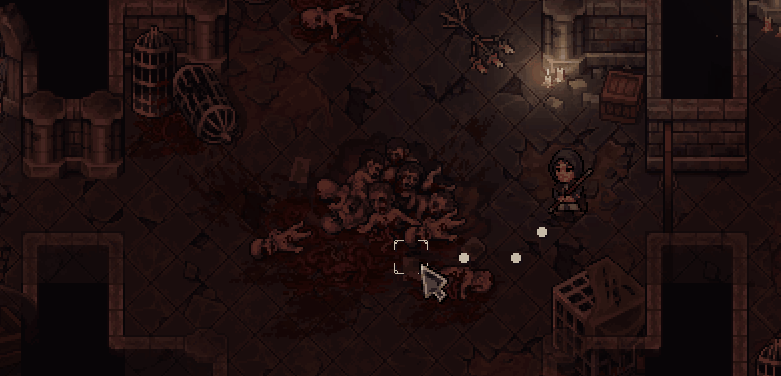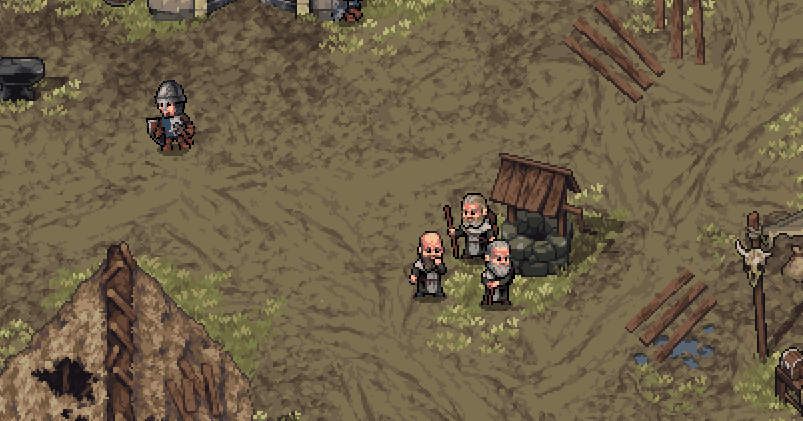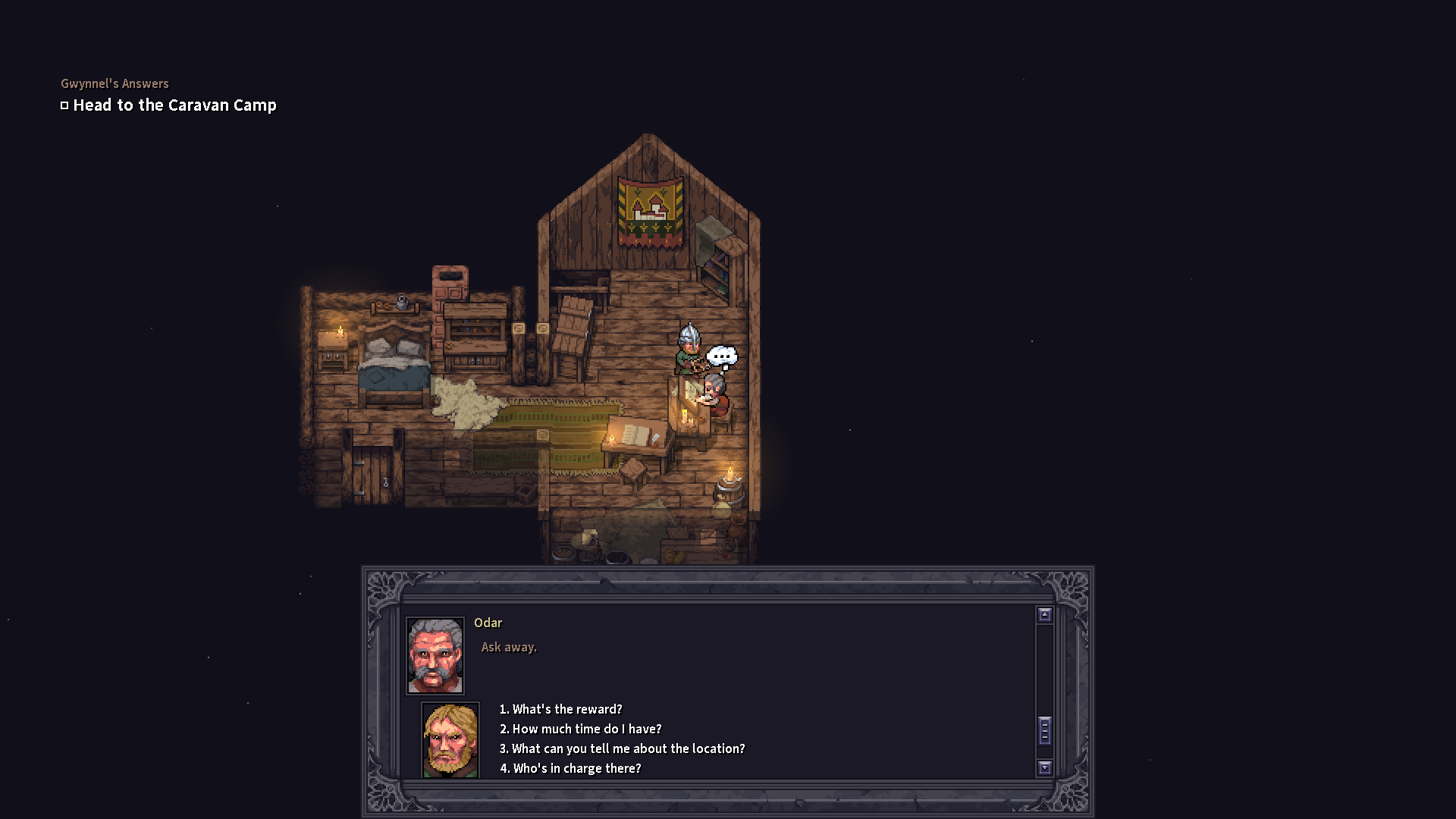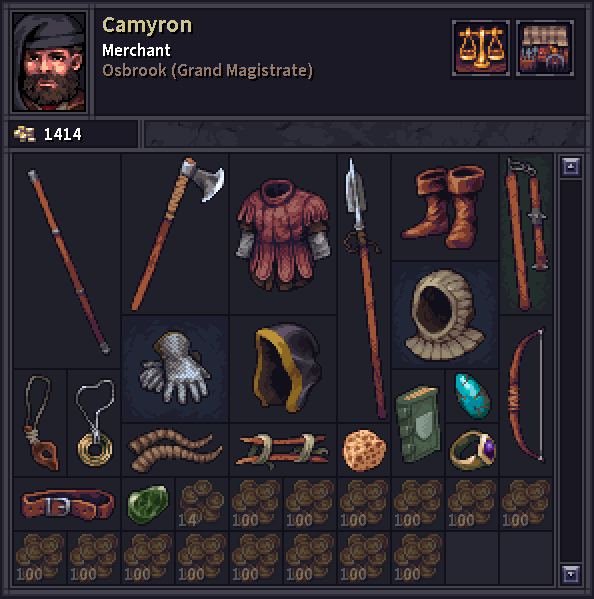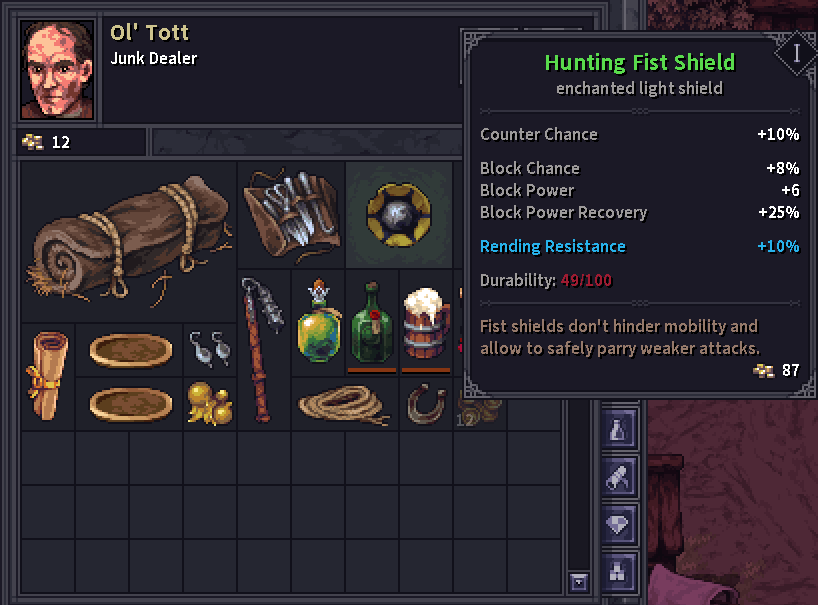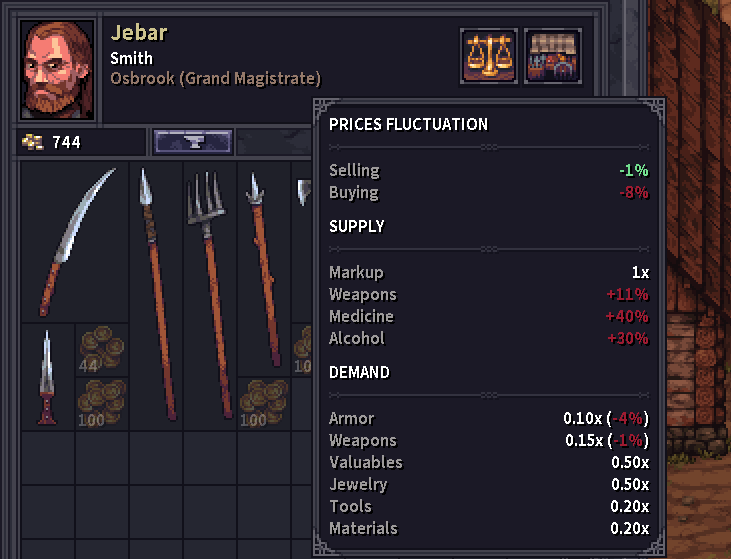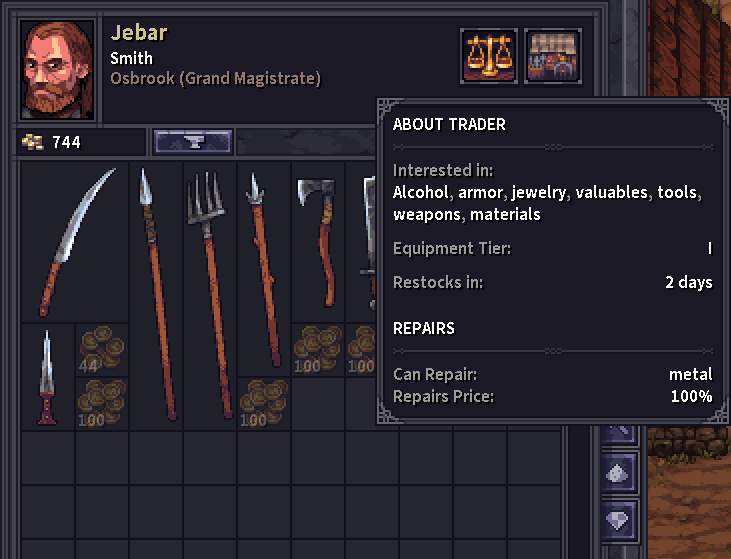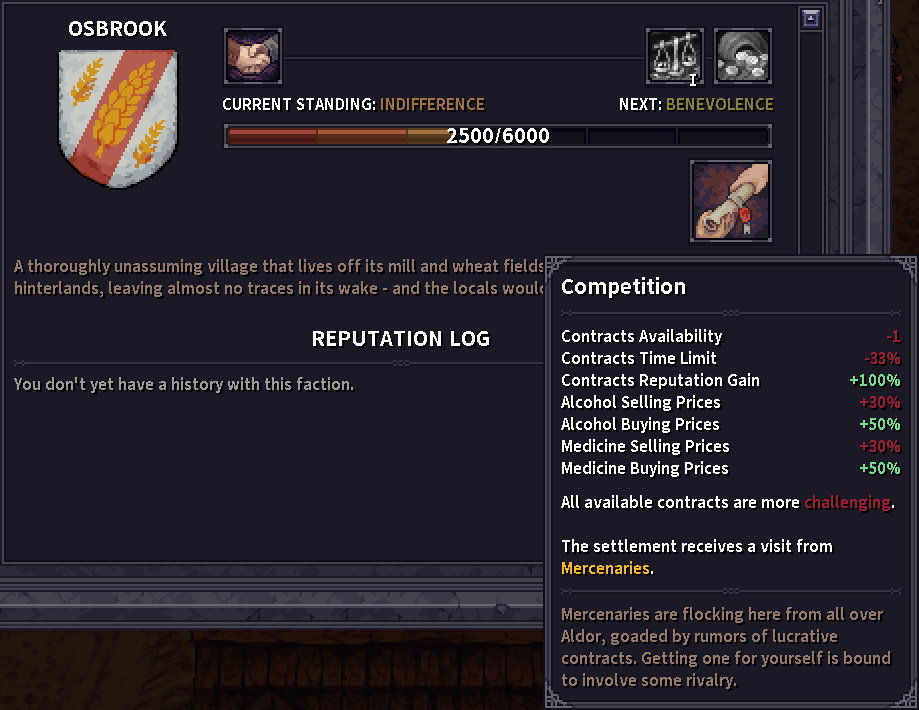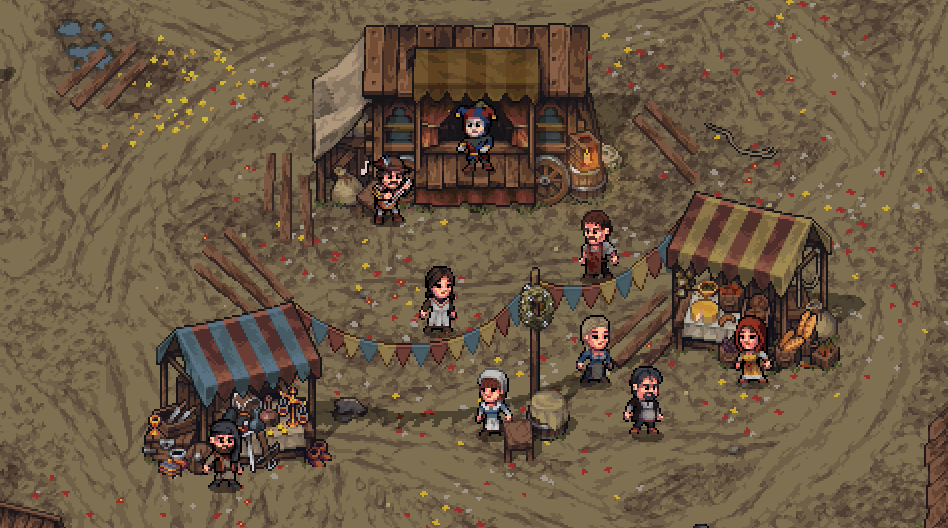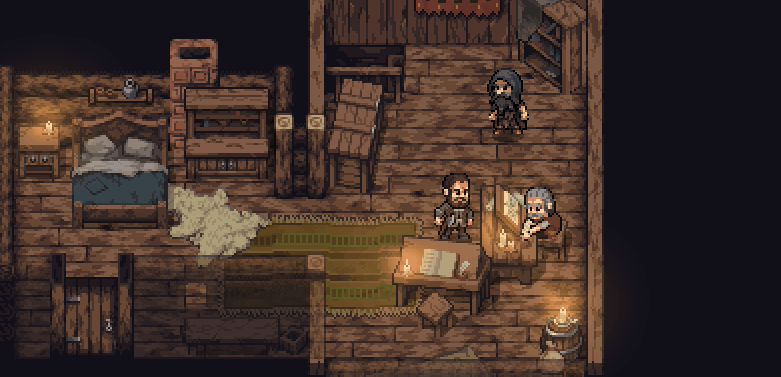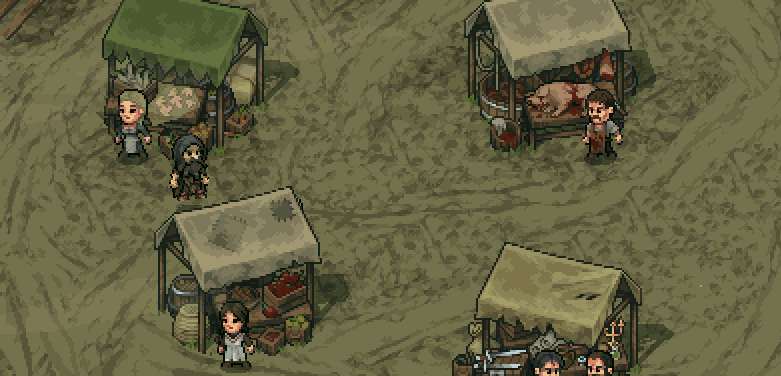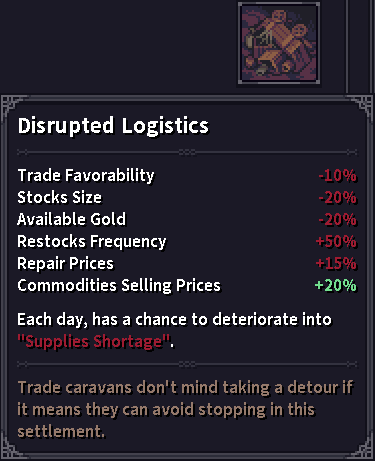All Events >
Stoneshard Events >
Devlog: Economy, Contracts, and Situations
Hello everyone!
In today’s devlog, we’ll cover the remaining three major systems that will be a part of the upcoming Rags to Riches update: reworked Contracts, Economy, and Settlement Situations.
CONTRACTS
Let’s start with the Contract System: there’s a lot of sweeping changes to talk about, from the list of available contracts to numerous QoL improvements.
While reinventing contract types, we put a lot of effort into boosting their variety: for the most part, old contracts could be boiled down to killing a dungeon boss (and sometimes looting a quest item in the same room afterwards). In Rags to Riches, the vast majority of contracts will feature entirely new objectives, and the few legacy ones will be greatly expanded upon through additional mechanics.
For instance, Cursed Folios will now buff every Undead in the Crypt - the effect grows weaker with each destroyed Folio. Then there are Forbidden Grimoires which will possess a number of tricky effects, making their retrieval a rather unorthodox ordeal. Another good example would be the Catacombs’ “Source of Corruption” contract: before you can actually reach the defiled relic itself, you’ll first need to destroy a bunch of well-guarded altars…
- All contracts now have
consequences
. A failed contract is guaranteed to add a problematic modifier to the corresponding dungeon during its next respawn. A failure may also result in Negative Settlement Situations - we’ll take a closer look at those at the end of the devlog. The system works both ways though: a successfully completed contract will make the whole area safer, which in turn attracts foragers, pilgrims, and roaming traders.
- Contracts will no longer stay available indefinitely, waiting for your character to accept them at his or her leisure. In Rags to Riches, contracts will be constantly rotated, emulating the efforts of other mercenaries. Any contracts you don’t accept will be either completed or failed in the background, resulting in the same consequences as if they were undertaken by you.
- Contract-related dialogues were significantly expanded with
many new options
, allowing you to better prepare for your expeditions. First of all, you’ll once again be allowed to choose from every available contract (if there’s more than one). Secondly, contract givers can now inform you about the dungeon’s size, any possible modifiers affecting it (such as the Crypts’ restless spirits or the Catacombs’s malign rituals) and hint at the type of miniboss you might encounter inside.
New dialogue options will also include the ability to haggle for better payment, which will either decrease your Reputation reward or require you to complete the contract within a much shorter time frame. Other than that, you’ll be able to cancel an ongoing contract without having to wait for it to expire naturally. And once you make a name for yourself in the settlement, you’ll be eligible to request advance payment for your services - keep in mind though, failing a contract after accepting an advance will result in much higher Reputation penalties than usual.
ECONOMY
Let’s move onto the Economy: how will it change in Rags to Riches?
One of our main goals while working on the Economy was to make it much more dynamic, requiring players to always pay attention and adapt accordingly. To achieve this, we decided to introduce two new mechanics: Price Fluctuations and Price and Demand.
-
Fluctuations
are random shifts in selling and buying prices that can occur within a set range. This system is meant to reflect the fickleness of the market while also avoiding overly complex simulations - those would appear way too obscure and convoluted to anyone unfamiliar with their inner workings.
All in all, Price Fluctuations are expected to add an element of unpredictability to every trade interaction: upon arriving at a settlement, you might notice that local prices are surprisingly cheap, creating an opportunity to purchase more supplies than you originally planned - or vice versa.
-
Supply and Demand
make prices less static as well. However, instead of relying on randomness, they respond to your character’s actions and ongoing Settlement Situations. For instance, buying out an entire shipment of meds will result in every trader in the village raising medicine prices upon their next restock. The system may swing into the opposite direction too - dumping a bunch of trophy weapons onto the market will make the settlement’s traders offer much less gold for them in the future.
Some item categories will be exempt from this mechanic. First and foremost, this applies to Valuables, the price of which will always remain more or less the same, minus the random Price Fluctuations.
Eventually, Supply and Demand will balance themselves out. The amount of time needed for this depends on the degree of turmoil affecting the market: if the price of an item category changes drastically enough, it may require up to a couple weeks to return to its original value.
- NPCs now boast reworked
trade settings
, which will allow us to adjust their preferences with more flexibility and add features that haven’t been possible within the old system. For example, some traders will replenish only a portion of their goods rather than their entire stock, others might only purchase items of specific quality, origins, or Durability, sell damaged equipment, and so on.
Traders were also given
additional hovers
that should make it easier to trace the finer nuances of the updated Economy without relying on trial and error: you’ll have an option to see what item categories each trader is interested in, what prices they’re willing to offer for them, and when to expect their next restock.
- A special role in the updated Economy is delegated to numerous
Commodities
that are produced in industry-oriented village Outskirts. Different settlements will have varying interest in wine, grain, charcoal, salt, cider, and timber, allowing business-savvy players to profit from selling them where they’re needed the most.
SITUATIONS
And now for the closing section of today’s devlog - it’s time to talk about Settlement Situations, which has already been mentioned multiple times while listing changes to the Contract System and Economy. Situations are designed to liven up already existing villages and provide players with new opportunities and challenges.
All situations are split between the following categories:
Positive, Neutral, and Negative
As suggested by their name, Positive Situations are centered around various boons and new opportunities. Neutral ones come with both beneficial and detrimental effects. And Negative Situations mostly harm the affected settlement and lead to the emergence of Negative Economical Situations.
Each Situation comes with its own special effects, often adding new NPCs as well as altering some of the existing speech and dialogue lines. In total, Rags to Riches will feature 12 Situations: 9 main ones and 3 focused around economy.
Positive Situations:
-
“Fair”
is organized by traveling merchants, who offer a large selection of goods for affordable prices.
-
“Rut”
will repopulate all dens around the settlement, increasing animal spawn rates, and attracting hunters, who are always partial to making a trade.
-
“Bloom”
greatly boosts the amount of plants and mushrooms in the area while also increasing the demand both for them and medical items. The village itself gets a visit from a group of peasant foragers, who’ll gladly sell any rare plants they’ve collected.[/list]
Neutral Situations:
-
“Competition”
stems from the presence of rival mercenaries in the village. It reduces the number of available contracts, adds negative modifiers to the remaining ones, and narrows the time window for their completion. On the upside, these high difficulty contracts will net you a much bigger reward.
-
“Pilgrimage”
is tied to a group of monks who wander between the holy sites of Aldor. They’re capable of granting a lengthy blessing to your character and boost the reputation gain for completing Crypt and Catacomb contracts. At the same time, they put a noticeable strain on local food and medicine prices.
-
“Reinforcements”
signify the arrival of additional guards. This Situation reduces the number of enemies and ambushes around the settlement while also increasing the price of food and alcohol. To offset this, you’ll be able to earn some Reputation simply by killing any remaining enemies around the village.[/list]
And finally,
Negative Situations
: they serve as a possible outcome of failed contracts, when dungeon-dwelling brigands and cultists are allowed to run amok.
- Failing or ignoring Bastion contracts may lead to
“Dangerous Roads”
, increasing the chance of ambush in the area and limiting the local traders’ stock.
- When left unchecked, necromancers might unleash
“Nightmares”
upon the area, reducing the effectiveness of sleep as well as preventing it from granting Vigor or replenishing Morale and Sanity.
- Left to their own devices, Catacomb cultists may eventually begin spreading
“Pestilence”
, poisoning plants, animals, and people in and around the nearby settlement.
Once the rumors about a settlement’s misfortune (and Negative Situations besetting it) become too egregious to ignore, it will start getting fewer visits from supply caravans, which leads to the emergence of gradually deteriorating
Negative Economical Situations
that may further damage the local traders’ stock size and significantly increase their selling prices.
Positive and Neutral Situations can only exist as single instances, lasting for a few days before potentially reappearing in another village. Negative Situations, on the other hand, won’t go away by themselves, although their effect can still be easily countered: all you need to do is to complete a contract tied to the corresponding dungeon (or wait for someone else to handle it for you). And once that dungeon is cleared out, it won’t take long for the settlement to return to normal.
============================================
That’s all for now. This concludes the final devlog dedicated to Rags to Riches’ major additions - the next one will showcase all the work we’ve done over the last year (including a number of previously unannounced features and improvements) and reveal the update’s release date!
Until next time!







![Glory to Codexia! [2012] Codex 2012](/forums/smiles/campaign_tags/campaign_slushfund2012.png)

















